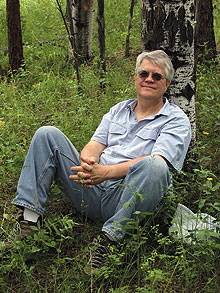  |
| HOME | THIS ISSUE | CALENDAR | GRANTS | BACK ISSUES | < BACK | NEXT > |
Tropical species may be threatened by global warmingby Colin Poitras - October 14, 2008
|
||||
| Contrary to conventional wisdom, tropical plant and animal species living in some of the warmest places on Earth may be threatened by global warming, according to UConn ecologist Robert Colwell and an international team. Their research is featured in the Oct. 10 issue of Science magazine. As Earth’s climate has warmed in recent decades, the geographical ranges of well-studied bird, butterfly, and plant species in the U.S. and Europe have moved northward, following the gradual northward shift of their familiar climates, says Colwell, Board of Trustees Distinguished Professor of Ecology and Evolutionary Biology and the report’s lead author. Studies have also shown that some species in the U.S. and Europe have shifted to higher elevations, as temperature zones on mountains have moved upward. Tropical climates have not been immune to global climate changes. They are now as warm as they have been at any time during at least the past two million years, Colwell says. Yet little research attention has been given to the impact of global warming on the geographical distribution of tropical plant and animal species. Colwell’s report in Science could change that. The report points out that tropical climates have warmed more than 1.4 degrees Fahrenheit since 1975, and climate models predict an additional increase of nearly 6 degrees Fahrenheit over the next century in the tropical forests of Central and South America. This much warming would shift temperature zones uphill about 600 m (nearly 2,000 feet) in elevation. Tropical species, like those at higher latitudes, will likely be driven to higher elevations by these changes, following the climate zones to which they are now genetically adapted. Because the tropical forests from Mexico to Brazil vary little in temperate regime, successful latitudinal range shifts are unlikely for tropical species. “The conventional wisdom among some segments of the scientific community is that animal and plant species in the tropics – some of the warmest areas on Earth – will not be significantly impacted if temperatures in their habitats increase under the effects of global warming,” Colwell says. “There is growing evidence, however, that many species in the lowland rainforest and tropical mountain regions are indeed likely to be impacted. Significant biotic attrition could occur if these species are unable to adapt rapidly to warmer temperatures – unlikely for species such as long-lived tropical trees – or fail to shift their distributions up cooler mountain slopes.” Working their way up the forested flank of a Costa Rican volcano rising nearly 3,000 m (10,000 ft) above the coastal plain, Colwell and his colleagues collected data on the altitudinal ranges of nearly 2,000 species of plants and insects. They report that about half these species have such narrow altitudinal ranges that a 600 m uphill shift would move these species into territory completely new to them, beyond the upper limits of their current ranges on the mountainside. But many may be unable to shift, because most mountainside forests in the tropics have been severely fragmented by human land use. “The impact of human land use in the rainforest and on mountain slopes in most parts of Costa Rica cannot be overstated,” Colwell says.
“For example, an orchid species that grows only on the limbs of old-growth forest trees and is pollinated by deep-forest bees faces a particularly difficult struggle if the forest corridor to higher elevations has been fragmented by clearing for agriculture.” Meanwhile, tropical lowland rainforests face a challenge that has no parallel at higher latitudes, he says: If the current occupants of the lowlands shift uphill, tracking their accustomed climate, there are few replacements waiting in the wings, currently living in even warmer places. “We are concerned about the overall biodiversity and ecosystem function of lowland rainforest habitats if key species are driven uphill by warmer temperatures,” Colwell says. According to Colwell and his colleagues, the threat of lowland attrition from warming climates faces about half the species they studied in Costa Rica. Some scientists argue that lowland species may still retain the tolerance to higher temperatures that they developed millions of years ago when the world was much warmer, but Colwell and his colleagues question this assumption, pointing to recent data showing that lowland trees are growing more slowly in hotter years. Only further research can estimate the risk, Colwell says, but the Science report indicates that the impact of global climate change on some tropical rainforest and mountain species could be significant. The report featured in this week’s Science magazine is based on some of the data amassed during 15 years of research by Colwell and his colleagues, funded by the National Science Foundation. Others involved in the study include Gunnar Brehm of the Friedrich-Schiller-Universität in Jena, Germany; Catherine Cardelus of Colgate University in Hamilton, N.Y.; Alex Gilman of the University of California in Los Angeles, Calif.; and John Longino of Evergreen State College in Olympia, Wash. Cardelus earned her Ph.D. at UConn. The research team often endured challenging conditions to complete its work in the 183 square-mile Braulio Carrillo National Park in Costa Rica, along a rugged trail known as the Barva Transect on the steep slopes of the Barva volcano. The area is so remote that supplies to construct shelters had to be brought in by helicopter. Some areas were inaccessible for months during the rainy season, complicating data collection on the mountainside to compile the database of nearly 2,000 species of plants and insects used in the study. The complete article is available at http://www.sciencemag.org/ to members of the UConn community who have a subscription to Science or are within the uconn.edu domain. |
| ADVANCE HOME UCONN HOME |

